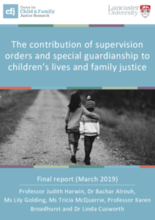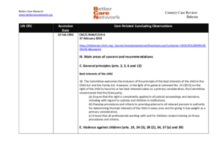Displaying 331 - 340 of 1070
The present study aimed to measure lifetime prevalence and frequency rates of child physical and emotional abuse, neglect, domestic violence, and several types of sexual and peer victimization among adolescents in residential care.
This study aimed to determine the relationship of intergenerational abuse with child emotional maltreatment (CEM) among 11–17 years old children residing in peri-urban and urban communities of Karachi, Pakistan.
This report is about the use of ‘family orders’ to support family reunification and placement with family and friends as outcomes of S31 care and supervision proceedings brought under the UK Children Act 1989. The over-arching aim of this study is to understand the opportunities, challenges and outcomes of these orders, and their use at national and regional level.
This study investigates staff perspectives on a new form of intensive oversight developed in New York State to prevent maltreatment of youth in care facilities.
The Child Protection Hub for South East Europe’s (ChildHub) overall objective is to contribute to the realisation of children’s fundamental rights across South East Europe, in particular the rights to be protected from abuse and violence. This report presents the findings of the final evaluation of this project.
This country care review includes the care related Concluding Observations adopted by the Committee on the Rights of the Child as part of its examination of Guinea’s periodic report to the Convention on the Rights of the Child.
This country care review includes the care-related Concluding Observations adopted by the Committee on the Rights of the Child.
To ensure protection of children from institutional abuse, there is an urgent need to review the existing laws in terms of their efficacy to protect children and feasibility in implementation. The present study suggests possible solutions, by trying to understand standardized and effective models of care systems and mechanisms.
The goals of this study were twofold: (1) to compare the pragmatic language skills (i.e., social communication skills) of 42-month-old neglected children with those of same-aged non-neglected children and (2) to measure the prevalence of pragmatic difficulties among the neglected children.
This study examined the relationship between receipt of child care subsidies and child maltreatment investigations in a sample of low‐income mothers in Illinois, USA.




